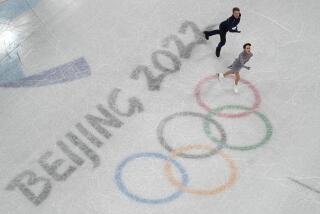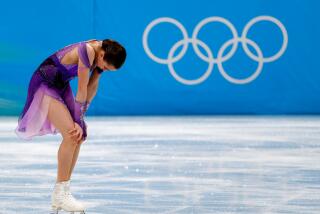It’s Out With Bad Air and in With the Gold
- Share via
NAGANO, Japan — “Grandpa Ross,” a child may say to Ross Rebagliati some day in the 21st century, looking at a keepsake in a 1998 Winter Olympic trophy case, “how did you get your gold medal?”
“Second-hand smoke.”
In a funny spin on President Clinton’s classic denial, a 26-year-old Canadian gets to be an Olympic gold medalist for life, because he inhaled but didn’t smoke.
At least, that’s how Rebagliati explained testing positive for marijuana here. Other people smoked. All he did was breathe.
And the Olympic powers-that-be bought it. Case closed.
Canada’s authorities always get their man. Japan’s didn’t.
It was win, lose, win here for British Columbia’s blond bombshell. He wore an all-American--all right, all-North American--varsity letterman’s jacket to his redemption announcement in Nagano, red and white, with a “98” patch on the left sleeve. He stepped right out of “Happy Days.”
The Canadian was ecstatic. He stood and dangled his medallion, for the photographers to snap.
He hadn’t yet given it back, and, he said, “It wasn’t going to be easy getting it back from me, that’s for sure.”
On a Sunday here, Rebagliati won the first Olympic snowboarding event ever held.
A couple of days before, he had happened to observe that snowboarding must be a big-time Olympic sport now, because they do drug-testing.
On a Monday, traces of marijuana were found in his lab test. On a Tuesday, it was voted--by the slimmest of margins--to strip the Canadian of his medal.
On a Wednesday, he let Japanese cops search his room. (Possession here is punishable by up to five years in prison. Japan takes pot very seriously. Ask Paul McCartney.) Nothing was found.
That same day, Rebagliati explained to the Canadian Olympic Assn., to the Nagano Olympic Committee, to the International Olympic Committee and everybody but a House Un-American Activities Committee that he hadn’t smoked a thing since April 1997--except, you know, perhaps an opponent who finished in second place. Ha, ha. Just kidding.
Here’s what I think happened, the athlete said: Snowboarders galore were up there smoking up a storm. All that second-hand smoke, well, remember what the surgeon general says.
That made sense to the COA’s chief, Carol Anne Letheren. “If there were eight to 10 people in a room smoking, one hour a day, for six days running . . . “ she said, trailing off like a puff of smoke.
Yes, Ross attested, I did smoke in the past. A social thing. Didn’t rule my life. Behind me now.
Somebody raised a hand and asked Rebagliati, “If this had happened to another athlete and his defense was ‘second-hand smoke,’ would you have been skeptical?”
“I can’t comment on that,” he commented.
It was at approximately 6:15 on a Thursday night here that the COA was given the all-clear. Canada’s hero could have back his banned gold. Everybody back home in Whistler, B.C., could breathe a sigh of relief.
“My dad was out of the country before I got the news [on testing positive],” Rebagliati said. “He’s been nothing but supportive from the start. I talked to my grandma. She was so good about it. And I talked to my sister. She just said, ‘Stay confident.’
“The support I got from Whistler was tremendous. And I got letters from as far away as Australia.”
Tremendous pressure.
That’s what the COA official, Letheren, called it. “I can’t think for a minute that this has been easy for him. I can say that I think it is a real opportunity for him to demonstrate leadership in the sport of snowboarding.”
Yes, by leaving the room when somebody lights up.
More to Read
Go beyond the scoreboard
Get the latest on L.A.'s teams in the daily Sports Report newsletter.
You may occasionally receive promotional content from the Los Angeles Times.






